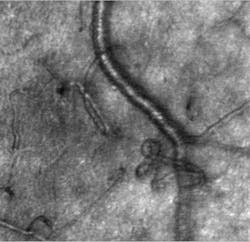A team of researchers at Indiana University (IU; Bloomington, IN) has developed an optical device that can detect early warning signs of diabetic retinopathy, which is the potential loss of sight associated with diabetes. Their discovery could have far-reaching implications for diagnosis and treatment of the disease, which affects over 25 million Americans.
Related: Novel ophthalmic imaging with adaptive optics, confocal imaging, and OCT
The device—designed by Stephen Burns, a professor and associate dean in the IU School of Optometry—takes advantage of adaptive optics, which uses small mirrors with tiny moveable segments to reflect light into the eye to overcome optical imperfections. Using this approach, the tiny capillaries in the eye appear quite large on a computer screen. These blood vessels are shown in a video format, allowing careful focus and observation of blood cells moving through the blood vessels. After imaging each patient's eye, highly magnified retinal images are then pieced together with software, providing still images or videos.
"We had not expected to see such striking changes to the retinas at such early stages," says Ann Elsner, a professor and associate dean in the IU School of Optometry and lead author of the study. "We set out to study the early signs, in volunteer research subjects whose eyes were not thought to have very advanced disease. There was damage spread widely across the retina, including changes to blood vessels that were not thought to occur until the more advanced disease states."
Because these changes had not been observable in prior studies, it is not known whether improved control of blood sugar or a change in medications might stop or even reverse the damage. Further research can help determine who has the most severe damage and whether the changes can be reversed.
In the study, patients with diabetes had significantly thicker blood vessel walls than found in controls of similar ages, even for relatively small diameter blood vessels. The capillaries varied in width in the diabetic patients, with some capillaries closed so that they no longer transported blood within the retina. On average, though, the capillaries that still had flowing blood were broader for the patients with diabetes. These diabetic patients had been thought to have fairly mild symptoms. In fact, the transport of oxygen and glucose to the retina is already compromised.
Full details of the work appear in the journal Biomedical Optics Express; for more information, please visit http://dx.doi.org/10.1364/BOE.5.00096.
-----
Don't miss Strategies in Biophotonics, a conference and exhibition dedicated to development and commercialization of bio-optics and biophotonics technologies!
Follow us on Twitter, 'like' us on Facebook, and join our group on LinkedIn
Subscribe now to BioOptics World magazine; it's free!
